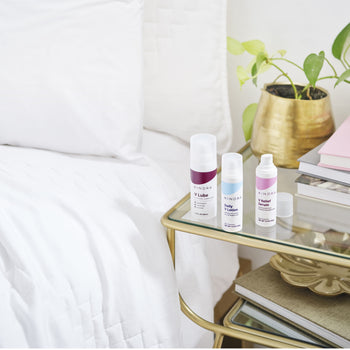Let’s be honest: orgasms are one of the most misunderstood (and often overlooked) parts of women's sexual wellness. They’re frequently sensationalized in media, simplified in sex ed (if they’re covered at all), and rarely spoken about with real honesty, even though they’re deeply connected to our physical, mental, and emotional health.
In honor of National Orgasm Day, we’re turning the spotlight onto your pleasure. Whether you’re trying to orgasm more often, more easily, or for the very first time, this guide is for you.
First Things First: What Is an Orgasm, Really?
An orgasm is a powerful neurovascular response, meaning it's the result of stimulation that activates nerves, blood vessels, muscles, and brain chemicals. For people with vulvas, an orgasm typically involves rhythmic contractions of the pelvic floor muscles, a spike in dopamine, and a flood of oxytocin and endorphins. It’s a total-body experience that starts in the brain and ends in the pelvis.
It’s also deeply individual. Some orgasms are intense and whole-body; others are soft, slow, or even delayed. And all of that is normal.
So... How Common Are Orgasms for Women?
Here’s the truth: for many women, orgasm doesn’t happen easily, or at all.
-
Only 18.4% of women report always having an orgasm during partnered sex (compared to over 60% of men).
-
About 10–15% of women say they’ve never had an orgasm.
-
Roughly 30–40% of women have difficulty climaxing regularly, a condition known as anorgasmia.
But those stats don’t mean orgasms are out of reach. They just mean there’s a gap in knowledge, access, and support and that’s something we can change.
Why Orgasms Can Be Tricky (Especially With Age)
Let’s break down a few common reasons orgasms feel harder to reach, especially for midlife women or anyone experiencing hormonal changes:
1. Clitoral Stimulation Is Often Overlooked
Most women don’t orgasm from penetration alone. The clitoris is the primary pleasure center, yet it’s often ignored during partnered sex or even solo play.
2. Hormonal Shifts Impact Sensitivity
Menopause, perimenopause, and even postpartum periods can decrease blood flow, lubrication, and sensation in the vulva and clitoris, making orgasm more elusive.
3. Pain or Dryness Disrupts Pleasure
If penetration feels like sandpaper or you're experiencing vulvar irritation, that discomfort can override pleasure signals—making climax difficult or impossible.
4. Stress, Anxiety, and Distraction Get in the Way
Sex isn’t just physical—it’s mental. When your brain is in overdrive, it’s hard to get into your body. Stress and lack of mindfulness are major orgasm blockers.
5. Lack of Communication or Confidence
If you don’t feel safe, relaxed, or able to communicate your needs, it’s harder to let go and fully enjoy the moment.
What to Do If You're Having Trouble Orgasming
If orgasms are rare (or nonexistent), start here:
Talk to a Provider
First, rule out any underlying medical issues—like nerve damage, medication side effects, pelvic floor dysfunction, or hormonal imbalances. A qualified OB/GYN or sexual medicine specialist can help.
Relearn Your Own Pleasure
What worked at 25 might not work at 45—and that’s okay. Explore different kinds of touch, toys, and techniques. Masturbation is not just okay—it’s encouraged. It’s one of the best ways
Address Dryness + Irritation
If you’ve noticed that things feel dry, tight, or uncomfortable, you’re not alone. Declining estrogen affects the vaginal tissue, but you don’t need hormones to fix it.
Kindra’s V Relief Serum and Daily Vaginal Lotion are designed to support the vulva with clinically tested ingredients that help hydrate, soothe, and restore comfort—no hormones required.
Vaginal Moisturizers
Be Patient with Yourself
This isn't about performing or "fixing" anything—it's about supporting your body, understanding its signals, and giving it what it needs.
6 Science-Backed Ways to Have Better Orgasms
Whether you’re having them already or just getting started, these strategies can help make your orgasms stronger, more frequent, and more enjoyable:
1. Prioritize Foreplay
Research shows that longer, more intentional foreplay is directly linked to better orgasms for women. Think sensual touch, extended kissing, clitoral stimulation, or even erotica—whatever gets your body (and brain) in the mood.
Use a silicone-based lubricant like Kindra’s V Lube to make touch feel smoother and more stimulating.
V Lube
2. Practice Mindful Masturbation
Being present during pleasure can help intensify sensation and reduce performance pressure. Focus on your breath, the feeling of your body, and what brings you joy—not on the outcome.
3. Strengthen Your Pelvic Floor
Pelvic floor exercises (Kegels) can improve muscle tone, enhance blood flow, and increase orgasm intensity. A 2010 study found that women who practiced daily Kegels experienced more frequent and stronger orgasms within 12 weeks. A stronger pelvic floor also helps with bladder control and core stability.
4. Use a Vibrator or External Stimulator
Research shows that over 50% of women who experience orgasm difficulties find success using a vibrator. These tools increase blood flow and can help train the brain-body connection around arousal and climax.
Vibrators
5. Try New Positions or Routines
Sometimes a shift in movement, angle, or rhythm can make all the difference. Experiment with what feels good—without judgment.
6. Talk About What You Want
Whether solo or partnered, communication is key. Being able to express your desires, needs, and boundaries helps build emotional safety and that creates space for real pleasure.
Your Orgasm, Your Rules
Let’s be clear: orgasms are not the only goal of sex. But they are a legitimate part of sexual wellness and every woman deserves access to that joy, power, and connection.
Your orgasm might look different at 25 than it does at 55. It might come easily, or not at all. But no matter where you are on that journey, you’re not broken, and you’re not alone.
This National Orgasm Day, we’re not just celebrating climax—we’re celebrating you. Your body, your pleasure, and your right to feel good.
Leave a Reply
Tags: intimacy libido Low Sex Drive Masturbation Benefits orgasms painful sex sex sex drive sex education sexual health
















